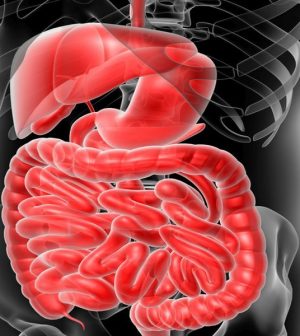- Could Your Grocery Store Meat Be Causing Recurring UTIs?
- Are You Making This Expensive Thermostat Error This Winter?
- Recognizing the Signs of Hypothyroidism
- 10 Strategies to Overcome Insomnia
- Could Artificial Sweeteners Be Aging the Brain Faster?
- Techniques for Soothing Your Nervous System
- Does the Water in Your House Smell Funny? Here’s Why
- Can a Daily Dose of Apple Cider Vinegar Actually Aid Weight Loss?
- 6 Health Beverages That Can Actually Spike Your Blood Sugar
- Treatment Options for Social Anxiety Disorder
Gut Microbiome May Play Role in Irritable Bowel Syndrome

Researchers believe they have found a link between lower bacterial diversity in the intestine’s microbiome and irritable bowel syndrome (IBS).
Normally, “more than 10,000 species of microorganism live in the human intestine,” noted study co-author Dr. Jung Ok Shim, a professor of pediatric gastroenterology, hepatology, and nutrition at Korea University College of Medicine in Seoul.
To study this, the investigators combined their own dataset with nine other published datasets, involving a total of 576 IBS patients and 487 healthy “control” patients.
What did they find? The gut bacteria was less diverse in IBS patients than in healthy people, Shim said.
The level of abundance of 21 specific bacterial species also differed between IBS patients and healthy controls, though the findings were not statistically significant, the study authors noted.
The findings were published online Jan. 18 in Microbiology Spectrum, a journal of the American Society for Microbiology.
The study proved this disturbed gut bacterial community “is associated with IBS, though this does not mean that the relationship is causal,” Shim said in a society news release. “Functional studies are needed to prove whether the change in gut microorganisms contributes to development of IBS.”
IBS is a common affliction, causing bloating, diarrhea, stomach pain and cramps. Its cause is unknown, and there is no effective treatment.
“Based on the epidemiological studies of IBS patients, altered gut microbiota was proposed as one of the possible causes of IBS,” the researchers wrote. “Acute bacterial gastroenteritis can cause chronic, asymptomatic, low-grade intestinal wall inflammation sufficient to alter neuromuscular and epithelial cell function.”
More information
The U.S. National Library of Medicine has more on irritable bowel syndrome.
SOURCE: American Society for Microbiology, news release, Jan. 19, 2023
Source: HealthDay
Copyright © 2026 HealthDay. All rights reserved.










